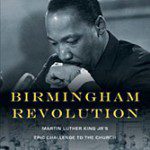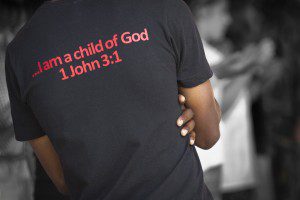“The work of engaging human suffering is hard and messy work. There are no drive-by responses or solutions to human suffering. This work requires intentionality. It requires consistency. It requires commitment. It requires all of you.”
— Michael Waters, author, Freestyle
This month at the Book Club, we’re featuring Freestyle: Reflections on Faith, Family, Justice, and Pop Culture, by the the Rev. Michael W. Waters. A preacher, speaker, author and founding pastor of Joy Tabernacle African Methodist Episcopal Church in Dallas, Waters self-identifies as a member of the hip-hop generation living in an urban context. In Freestyle, he faithfully riffs on everything from Trayvon Martin, pepper spray hospitality, and the postmillenial perils of black family, to the first time he laid eyes on his wife … all through the lens of hope.
 Here, the Rev. Waters shares some thoughts on hip-hop evangelizing, parenting in an age of paternal absenteeism, balancing marriage and work, and what he hopes readers take away from his book.
Here, the Rev. Waters shares some thoughts on hip-hop evangelizing, parenting in an age of paternal absenteeism, balancing marriage and work, and what he hopes readers take away from his book.
Explain the word Freestyle and how it fits the content of your book.
In hip-hop culture, freestyle occurs when a rapper or MC performs spontaneous, unrehearsed lyrics akin to the improvisation of jazz artists during a live performance. As a member of the hip-hop generation, freestyle fits the content of my book in that these musings flowed freely from my contemplation of life and life experiences. I did not specifically set out to write a book, and in this regard, there is a certain spontaneous, unrehearsed, and raw nature to it.
While you are concerned about some recent movements within the hip-hop community that mock faith and God, you also mention that hip-hop provides many with a sense of belonging. Do you see hip-hop offering opportunities to reach the unchurched?
There are significant opportunities for hip-hop to reach the unchurched. In fact, this has already been happening for years. However, for far too long, hip-hop has been viewed by some as an evangelism tool, not as a legitimate theological conversation partner for the church. I prefer to view hip-hop’s potential to reach the unchurched through a theological conversation partner paradigm. It would be a mistake to think that just because many within the hip-hop generations did not grow up in church that they do not possess meaningful contemplations concerning the person and nature of God. Hip-hop also possesses a strong and necessary critique of the church as hip-hop places a greater weight to our praxis in relationship to our faith than just to our faith statements alone.
In the first few pages of your book, you speak about the power of the Internet as it relates to news and blogging. What impact has the ability to instantly communicate via the Internet had on you personally as a pastor and writer?
John Wesley is famously quoted as saying “The world is my parish.” The Internet has allowed the world to become my parish, as well. With just the click of a button, I am literally able to reach people around the world. And the world has responded, as I have received responses from people across the globe. Therefore, I must be careful that whatever I write is a genuine expression of my thought as guided by the Holy Spirit. I believe that a certain accountability and integrity must accompany such an amazing opportunity as to communicate with the world.
What was different about the way you approached writing a book vs. blogging for Huffington Post?
The primary difference in my approach is that in blogging you are usually limited to 600–900 words. The conventional wisdom is that most people won’t read anything longer than that online. Therefore, in blogging, you must make your points and impact on the reader quickly with limited space. Also, the continuing dialogue is limited to the comments section, which is also word-count restricted. Writing a book has allowed me not only to extend the conversation beyond the initial writings but to invite extended dialogue on the subject matters presented, something I value very much.
In FREESTYLE, you write, “Too often the church is, as I was, quick to meet human suffering with disgust and frustration rather than compassion and service.” Why do you think the church is not more willing to play a greater role in alleviating suffering?
The work of engaging human suffering is hard and messy work. There are no drive-by responses or solutions to human suffering. This work requires intentionality. It requires consistency. It requires commitment. It requires all of you. Unfortunately, much of the church is given to radical individualism than to radical hospitality, and anything that seeks to draw the focus away from the individual and to his or her wants masquerading as needs is met with disgust and frustration. Many people in church have the same expectation as patrons of a restaurant: to be served and not to serve. We must all repent and commit ourselves more fully to serving our neighbors who are suffering right in front of our eyes.
You use the words “the children of addiction” as a description of your generation. Say a few words about what that means to you.
Many persons in my generation have been negatively impacted by family members, especially their parents, who abused or sold illegal drugs. The crack and cocaine epidemics of the 1980s and early 1990s have greatly shaped my generation. They were raised in homes where one or both parents were incarcerated because of drugs. A few have had to bear the weight of parents who stole from their own family or prostituted themselves on the streets for drugs. Even those who were raised in well-heeled communities struggled with parents who were functional addicts in that they could financially afford to support their habit, but the habit still destroyed their family. In the most painful scenarios, these children were the first to discover their parents after an overdose. And I have yet to mention those whose mothers used drugs while they were in gestation, and how this has affected their entire lives. I have ministered to adults who continue to deal with physical and intellectual struggles related to their mothers’ drug abuse while pregnant with them. As the late Tupac notably rapped, “I blame my mother for turning my sister into a crack baby!” This is the essence of the children of addiction’s struggles.
How has your generation’s experience affected the way you are raising your children?
Not a day goes by without me telling my children how much I love them and how special they are to me. This might seem like a small gesture, but another one of my generation’s greatest struggles has been paternal absenteeism. There are many in my generation who are now adults who have never heard their fathers tell them “I love you!” or “I am proud of you!” Some have gone years between interactions with their fathers, and I know more than a few who can count those interactions on one hand. There is no greater gift that a father can give his children than his active, loving presence and affirmation of their worth.
You have personally witnessed beatings, gun violence, drug addiction, and children neglected by parents and the community. Yet, you say Christians are called to manifest hope in the world. How do you find the courage and the strength to fulfill that calling?
God owns the patents to both courage and strength. I simply trust that God will give me the courage and strength that I need in order to fulfill the calling that God is living out through me. I don’t think that courage and strength can be found, but it surely can be received as a gift of the Holy Spirit.
Your wife is an attorney and you are a pastor, both very demanding jobs. How do you as a couple find balance mentally, physically, and spiritually?
My beautiful wife, Yulise, and I met as freshmen in college. Even then, we lived very active lives. My wife was a presidential scholar, a triple major, a track and field athlete, and a leader in the school’s gospel choir. I was an elected student body officer, a double major (I know, a slacker compared to my wife), who traveled and preached on many weekends throughout college. We had to learn very early how to find balance, and while we have not always succeeded, we have learned how to re-group and find our footing even when walking though challenging seasons of life. Communication is key to finding that balance, and it is important to learn how to find moments of reprieve and retreat despite the projects in front of you. It also helps to have a spouse who is my best friend, for just being in each other’s company is refreshing and renewing mentally, physically, and spiritually.
What do you hope to accomplish by writing this book?
I hope to inspire each reader to manifest hope in the world. I desire that each reader will discern God’s active presence in the world and join with God as co-laborers in securing a brighter day for all people.
Do you have plans for future books?
I would be humbled to have the opportunity to write more books. I have several ideas and writing projects already written at varying levels of completion. I am looking forward to any additional sacred surprises that God has in store for my life.
Visit the Patheos Book Club for more on Rev. Waters and Freestyle!













